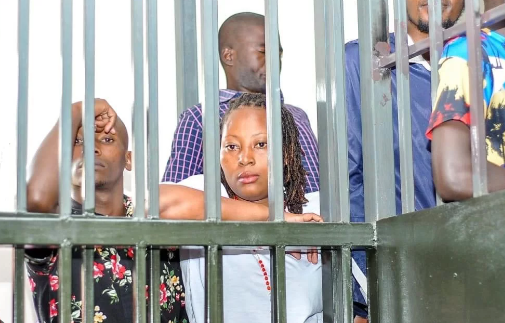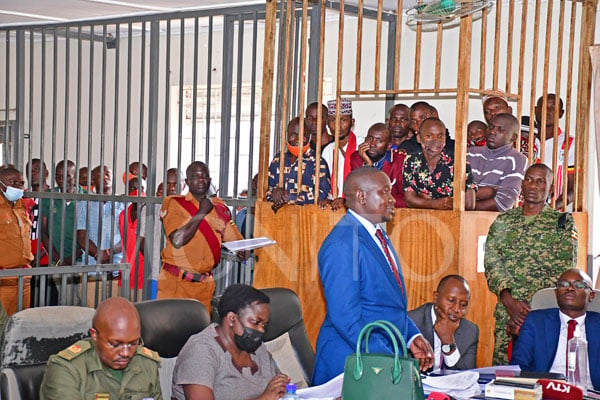Prime
We won’t beg Museveni for freedom- remanded NUP supporters

Mr Muhydin Kakooza, a NUP party supporter, raises his hand before he lashes out at the military court’s panel last week. Mr Kakooza, together with more than 30 other NUP party supporters, has been on remand for the last 20 months after being charged with being in possession of explosives. PHOTO/ABUBAKER LUBOWA
What you need to know:
- In 2022, Constitutional Court ordered that all files of civilians in military courts should be transferred to the High Court in 14 days under the stewardship of the Director of Public Prosecutions saying that the trial of civilians in court martial was illegal.
- The UPDF Act provides for circumstances in which the General Court Martial has jurisdiction over civilians, who appear to be the most prosecuted category of people there.
"We won't beg [President Yoweri] Museveni for our freedom. It's okay if you want to kill us for trying to fight for our country. You arrested us for trying to protect Robert Kyagulanyi's votes [during presidential elections] now you expect us to beg you to return our freedom! What crime did we commit! We will not relent," one of the political prisoners shouted from a military van taking them back to Luzira prison where they have been on remand for nearly four years.
This was Monday after the General Court Martial at Makindye, Kampala again denied the 28 National Unity Platform (NUP) supporters bail on grounds that the six soldiers on its panel did not find merit in the bail application.
The ruling from the highest court of military justice in the country chaired by Brig Gen Freeman Robert Mugabe is just one of the several orders that have blocked Olivia Lutaaya and 27 other NUP supporters from getting temporary freedom from jail.
The suspects were first remanded on charges of unlawful possession of 13 explosive devices following their arrest in December 2020 (during presidential campaigns) before an additional charge of treachery was slapped on them.
They have had several of their bail applications dismissed before by the army court, largely on grounds that their sureties were not substantial.
As a result, eight opposition MPs and a divisional mayor offered to stand surety for the suspects.
This was after the army court in its earlier ruling rejected their parents and spouses on grounds that they were not substantial sureties.
During hearing of the application, the state prosecutor, Lt Alex Mukhana who relied on the affidavit of ASP Julius Muzigiti opposed the bail application on grounds that the applicants are charged with one count of treachery contrary to section 129 of the UPDF Act, 2005 and one count of unlawful possession of ammunition contrary to section 3(1) and (2) (a) of the Firearms Act.
He also argued that the refusal or grant of bail is at court's discretion considering all the circumstances and merits of the application.
In the court’s ruling read by Brig Gen Mugabe, he said the court found no merit in the bail application, partly because the suspects allegedly don't have fixed places of aboard.
"...and court declines to grant bail to the applicants. The application is hereby dismissed. Court orders an expeditious trial of the applicants in the main case," he said forcing one of the suspects, Muhysdin Kakooza to turn rowdy.
He was subjected to a beating by soldiers deployed in the courtroom before he waa carried out and shoved into a waiting military van.
This was the third time Kakooza, frustrated by delayed justice, turned rowdy in the courtroom.
Outside the heavily guarded courtroom, Brig Gen Mugabe's ruling also sparked outrage as relatives of the suspects and politicians who had attended court protested, describing the decision as unfair.
No jurisdiction to try civilians
In 2022, Constitutional Court ordered that all files of civilians in military courts should be transferred to the High Court in 14 days under the stewardship of the Director of Public Prosecutions saying that the trial of civilians in court martial was illegal.
The UPDF Act provides for circumstances in which the General Court Martial has jurisdiction over civilians, who appear to be the most prosecuted category of people there.
Section 119(1) of the UPDF Act provides that “persons subject to military law” include serving military officers and: (g) every person, not otherwise subject to military law, who aids or abets a person subject to military law in the commission of a service offense; and (h) every person found in unlawful possession of (i) arms, ammunition or equipment ordinarily being the monopoly of the Defence Forces; or (ii) other classified stores as prescribed.
On the basis of section 119(1)(g) and (h), many civilians have been prosecuted before the General Court Martial for offenses such as the unlawful possession of firearms or ammunition, aiding and abetting soldiers to commit offenses and treason.
Attorney General Kiryowa Kiwanuka has since appealed to the Supreme Court, the Constitutional Court decision that nullified the trial of civilians in the court Martial and he awaits a decision.





